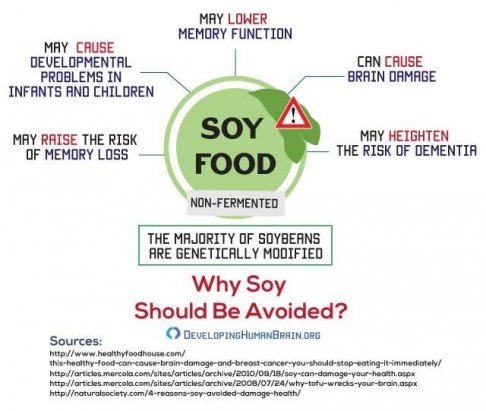Laron
QHHT & Past Life Regression
Staff member
Administrator
Creator of transients.info & The Roundtable
This topic can become complicated as there are many ways to look at the health impact of soy. One important fact is that GMO soy is likely not good for us.
It was in 1998 that the first genetically modified soybean was introduced to the U.S. market, by Monsanto. In 2014, 90.7 million hectares of GM soy were planted worldwide, 82% of the total soy cultivation area— right now, you an imagine that most sources of soy are GMO based, so the percentage could be higher/
A friend mentioned this about her experience with soy: "Just been to a talk about female hormones and healthy eating this past week, and the expert said to avoid all soy products apart from the fermented ones. Soy has Phytoestrogens that mimics Oestrogen. If someone has low Oestrogen production and need more, soy is a perfect food to bring balance. However, with modern diet of high gluten and sugar, most people have high Oestrogen level, not low. And high Oestrogen is associated with endometriosis, uteral fibrosis, breast cancer, PMS, mood swings...., and many more female health problems. I have stopped eating soy many years ago when I found a fibroid in my uterus, and have been advocating on avoiding soy ever since. The point is we have to eat according to our body type and what our body needs. Not just follow the trend of what is promoted as healthy food. The food industry will promote anything that sells." (...) "In China, 20% of women over 30 years old has endometriosis or uterine fibrosis. When I lived in Japan, my doctor also told me these are common health issues among Japanese women over 30. And they have a full organic non-GMO soy policy in all industries that use soybeans."
Then there is the issue of how soy beans are processed, and this can also lead to health issues.
Here is a December, 2010 article over on Dr Mercola's site:
Soy, a complicated topic!
It was in 1998 that the first genetically modified soybean was introduced to the U.S. market, by Monsanto. In 2014, 90.7 million hectares of GM soy were planted worldwide, 82% of the total soy cultivation area— right now, you an imagine that most sources of soy are GMO based, so the percentage could be higher/
A friend mentioned this about her experience with soy: "Just been to a talk about female hormones and healthy eating this past week, and the expert said to avoid all soy products apart from the fermented ones. Soy has Phytoestrogens that mimics Oestrogen. If someone has low Oestrogen production and need more, soy is a perfect food to bring balance. However, with modern diet of high gluten and sugar, most people have high Oestrogen level, not low. And high Oestrogen is associated with endometriosis, uteral fibrosis, breast cancer, PMS, mood swings...., and many more female health problems. I have stopped eating soy many years ago when I found a fibroid in my uterus, and have been advocating on avoiding soy ever since. The point is we have to eat according to our body type and what our body needs. Not just follow the trend of what is promoted as healthy food. The food industry will promote anything that sells." (...) "In China, 20% of women over 30 years old has endometriosis or uterine fibrosis. When I lived in Japan, my doctor also told me these are common health issues among Japanese women over 30. And they have a full organic non-GMO soy policy in all industries that use soybeans."
"In a major ongoing study involving 3,734 elderly Japanese-American men, those who ate the most tofu during midlife had up to 2.4 times the risk of later developing Alzheimer’s disease. As part of the three-decade long Honolulu-Asia Aging Study, 27 foods and drinks were correlated with participants’ health. Men who consumed tofu at least twice weekly had more cognitive impairment than those who rarely or never ate the soybean curd.1, 2
“The test results were about equivalent to what they would have been if they were five years older,” said lead researcher Dr. Lon R. White from the Hawaii Center for Health Research. For the guys who ate no tofu, however, they tested as though they were five years younger.
What’s more, higher midlife tofu consumption was also associated with low brain weight. Brain atrophy was assessed in 574 men using MRI results and in 290 men using autopsy information. Shrinkage occurs naturally with age, but for the men who had consumed more tofu, White said “their brains seemed to be showing an exaggeration of the usual patterns we see in aging.”" More: https://www.westonaprice.org/health-topics/soy-alert/soy-and-the-brain/.
Then there is the issue of how soy beans are processed, and this can also lead to health issues.
Here is a December, 2010 article over on Dr Mercola's site:
- "The health risks of soy outweigh its benefits. The Weston Price Foundation has compiled a list of dangers associated to soy consumption
- It is important to take note of the differences between unfermented soy and fermented soy – the unfermented type contains anti-nutrients that cause health problems
- About 90 percent of soy grown in the United States is genetically modified, which induces additional health problems
- Fermented soy, like tempeh, natto, miso, and soy sauce, offer numerous health benefits. Due to the fermentation process, the phytates and anti-nutrients of soy are reduced, and the food’s beneficial properties become available to your digestive system"
Soy, a complicated topic!
Last edited:



